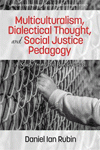
Multiculturalism, Dialectical Thought, and Social Justice Pedagogy
A Study from the Borderlands
By:
Daniel Ian Rubin, Jacksonville State University
A volume in the series: Critical Constructions: Studies on Education and Society. Editor(s): Brad J. Porfilio, California State University, Stanislaus. Marc Pruyn, Monash University. Derek R. Ford, DePauw University.
Published 2017
This monograph lays out a qualitative, collective case study designed to assess how students in a secondary Latina/Latino Literature class began to think dialectically about issues of social justice. By using various methods of data collection, I ascertained how the students’ thoughts and perceptions of Latinas/Latinos in this country changed over the course of the study. I introduced the students to both print and nonprint texts (e.g., news articles, documentary films) which, when presented through Karl Marx’s dialectical method, helped them see social justice issues, such as racism, poverty, and subjugation, more clearly and critically.
After analysis, several important themes emerged from the data: stereotyping and invisibility in the media, immigration, the notion of power, racism and discrimination, education, anger and frustration, and questioning. By the end of the Latina/Latino Literature class, all of the students in the study were able to identify particular social justice issues, explain the historical context which framed the current debates (e.g., immigration reform), and articulate their opinions of the issues. Each student participant started to use social justice terminology, which I introduced and used frequently in class (e.g., equity), and these words became a part of the students’ everyday vocabularies. Furthermore, by the completion of the class, the student participants began to realize that they had their own individual voices and could help transform societal issues in order to make the United States more equitable for all.
CONTENTS
Foreword. PART I: Contextualizing the Study. The Need for Dialectical Thought. The State of U.S. Secondary Education in a Time of Neo‐Liberalism. Focus of the Study. Creating a Latina/Latino Literature Class. Dialectical Thought. Social Justice. Semantic Conventions. Research Design. Organization of the Book. Notes. The Latina/Latino Literature Curriculum. School Context. Student Participants. Teaching Dialectical Thought. Article Analysis of Marxist Themes. Modeling of Dialectical Thinking. Questioning for Dialectical Understanding. Notes. PART II: Analyzing Participant Engagement With Dialectical Thought. Mia. Catina. Marco. Isidora. Alex. PART III: Further Analyses and Implications. What Does This All Mean? Stereotyping in the Media. Immigration. Power. Racism and Discrimination. Education. Anger and Frustration. Questioning. Intertextuality. Collective Intertextual Group Analysis. Emerging Theory. Summary. Note. The Larger Picture. Limitations. This Study’s Contribution to Current Literature. Where to Go From Here. Personal Reflections. Role of Researcher. Methods of Soundness. Subjectivity. Final Reflection. PART IV: The Additional Bits. A: Latina/Latino Literature Pre‐Questionnaire. Latina/Latino Literature Post‐Questionnaire. B: The Latin Lover Commercial Analysis. C: Latina/Latino Literature: Commercial Analysis. D: Final Culminating Project. References.
-
Paperback9781681238098
Web price: $45.04 (Reg. 52.99)
-
Hardcover9781681238104
Web price: $80.74 (Reg. 94.99)
- eBook9781681238111

- EDU037000 - EDUCATION: Research
- EDU020000 - EDUCATION: Multicultural Education
- EDU000000 - EDUCATION: General
-
 Charter School Report Card
Charter School Report Card
-
 DIY Punk as Education
From Mis‐education to Educative Healing
DIY Punk as Education
From Mis‐education to Educative Healing
-
 Imagining Education
Beyond the Logic Of Global Neoliberal Capitalism
Imagining Education
Beyond the Logic Of Global Neoliberal Capitalism
-
 Read Aloud Handbook for Native American Children
Read Aloud Handbook for Native American Children
-
 Rethinking Social Studies
Critical Pedagogy in Pursuit of Dangerous Citizenship
Rethinking Social Studies
Critical Pedagogy in Pursuit of Dangerous Citizenship
-
 The 2017 Hampton Reader
Selected Essays from a Working-class Think Tank
The 2017 Hampton Reader
Selected Essays from a Working-class Think Tank
-
 The Luso-Anarchist Reader
The Origins of Anarchism in Portugal and Brazil
The Luso-Anarchist Reader
The Origins of Anarchism in Portugal and Brazil

